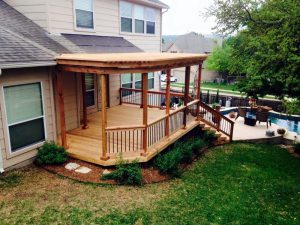Building a Pergola on an Existing Deck That Will Stay Beautiful for Years

A pergola is a great addition to an existing deck, but you’ll need to keep a few things in mind so that your pergola stays safe and sturdy.
Texas Remodeling Pros specializes in Pergola building along with full interior and exterior remodeling in San Antonio. Let one of our expert designers help you with your new pergola project. Call us today at 210-774-2666 or contact us online today!
How to Build a Pergola on an Existing Deck:Choose Great Hardware
There are lots of styles of pergolas you can build on your deck. You can even use lattice work on the sides of your pergola to create a DIY privacy screen that gives your pergola mock walls. But before you choose a style, you’re going to need to focus on the fundamentals. That means choosing the right hardware so you end up with a structure that will stay standing no matter what. Here are the pieces of hardware you’ll really want to focus on:
Post Bases:
A pergola requires at least four support posts that connect firmly to the deck, unless you’re going for a wall leaning style, which is a bit more complex. To affix the pergola’s posts to the deck, you’ll be using post bases, which will hold the weight of your entire structure. At the same time, since your pergola will sit on top of your deck, the hardware is going to be visible (hiding it is possible, but it takes extra work and time). That means you’ll want to choose something that’s designed to be seen, rather than your typical silver-colored, industrial-looking galvanized metal. When I was in this situation, I chose post bases that had been hot-dipped galvanized (which ensures your hardware won’t rust away anytime soon) and then powder-coated so it looked attractive, a bit like wrought iron.
Lag/Timber Bolts:
You’ll need timber bolts to connect wood to wood when you’re creating the top frame which will make up the roof of your pergola. Make sure you choose fasteners designed to work with western red cedar lumber. Again, I like to take looks into consideration even with something as basic as a timber bolt. Some timber bolts actually allow you to hide the ends of your bolts inside the beam, because it works from the inside out. This lets you get away without trimming off any bolt ends, and since the bolts also have a corrosive-resistant black coating, they’re tough against moisture and they look nice, too.
Post to Beam Support:
Along with bolts, you’ll need to use hardware to firmly connect your posts to the beams which will make up the top of your pergola. This hardware will be necessary for holding the structure steady during heavy wind, so you’ll want something made of thick steel, preferably hot-dipped galvanized. These fasteners will be a prominent part of the design, so if you don’t want to have to disguise them, choose post-to-beam supports that are meant to be seen.
Putting your pergola on a deck sets it up higher than it would be in your yard, making it a bit more vulnerable to movement from the wind. Because of this, the most important thing is to make sure you’re using thick galvanized steel fasteners, preferably with an extra coating to protect them. Hardware isn’t the only issue to think about when building a pergola on a deck, though. Here are some other things to keep in mind.
Tips for Making Your Deck Pergola Safe and Sturdy
Building a pergola on top of a deck is a bit more complex than building directly on the ground. When you build on the ground, you can bury your posts in the ground and use gravel, dirt, or concrete to give them more stability. On a deck you’re going to need to connect wood to wood, which can potentially make the pergola less stable. To help ensure that your pergola is as sturdy as it can be, here are a few tips I learned while building my pergola:
Use Western Red Cedar:
Your posts are carrying the weight of the whole structure, which means you need wood that can stand up to a lot of pressure. The last thing you want is main support beams which are vulnerable to wood rot or termites–it’s dangerous, and these are also the trickiest part of the pergola to replace. Western red cedar will resist ongoing damage from the elements as well as from insects, making it ideal for a long-lasting structure.
When in Doubt, Add Railings:
If you’re worried about how strong your pergola is, adding railings between the wooden posts can strengthen the structure as a whole.
Properly attach your support posts to the deck. Attach the four posts of your pergola to joist structure under the deck, not the floorboards of the deck. This is a lot like finding studs in your walls when you’re hanging something heavy. If you don’t attach the support posts to the deck framing, the deck boards could pull away and cause the entire pergola to come tumbling down.
Figure out how to build a pergola on an existing deck, safety should be your number one priority. Since you won’t have the ground to sink your posts in, that additional support needs to come from strong hardware and bolts. At the same time, you’ll want that hardware to be attractive, as it’s going to be a visible part of your structure.
Texas Remodeling Pros serving our friends and neighbors in San Antonio, Hollywood Park, Hill Country Village, Alamo Heights, The Dominion, Terrell Hills, Boerne, Castle Hills, Balcones Heights, Fair Oaks Ranch, Garden Ridge, Scenic Oaks, Leon Valley, Schertz, Shavano Park, Converse, Cibolo, Bulverde, Helotes, Live Oak, and surrounding areas.
Call us today at 210-774-2666 or contact us online today!
